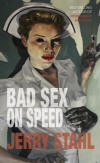Bad Sex on Speed
Jerry Stahl’s new novel, Bad Sex on Speed, represents an evolutionary step in his prose style. It’s a bit like the jump William Burroughs made from his straightforward first novel, Junky, to his famous and less conventional masterpiece Naked Lunch. Stahl has written a book attempting to match his words to the hallucinatory state of mind of an amphetamine user wafting through a state of psychosis. It’s spooky, the way he morphs into the minds of his crumbling characters. This is a narrative born, I suspect, from experience, but who knew Stahl swung this way? Readers of his oeuvre will be familiar with his narcotic portraits and episodes of heroin, the very opposite end of the spectrum from the territory he explores in this novel. This book’s Library of Congress classification will still fall under the general heading of “drug abuse,” but you won’t find much nodding in this story line, though you may wish a few of the characters within would catch a few hours of sleep.
Jerry Stahl’s new novel, Bad Sex on Speed, represents an evolutionary step in his prose style. It’s a bit like the jump William Burroughs made from his straightforward first novel, Junky, to his famous and less conventional masterpiece Naked Lunch. Stahl has written a book attempting to match his words to the hallucinatory state of mind of an amphetamine user wafting through a state of psychosis. It’s spooky, the way he morphs into the minds of his crumbling characters. This is a narrative born, I suspect, from experience, but who knew Stahl swung this way? Readers of his oeuvre will be familiar with his narcotic portraits and episodes of heroin, the very opposite end of the spectrum from the territory he explores in this novel. This book’s Library of Congress classification will still fall under the general heading of “drug abuse,” but you won’t find much nodding in this story line, though you may wish a few of the characters within would catch a few hours of sleep.
Bad Sex on Speed links a series of vignettes that portray the addled mind of a meth head running in high gear without much rest. This book might baffle those who have sampled nothing stronger than some Lipton tea, and if this is the case, you will have to trust Jerry Stahl’s vision of a world gone amok. “Memories on speed,” he writes, “are like little children running in traffic, only there are not enough cars to hit them all.” He has, nevertheless, managed to nail a few down.
Let me give you a sample. In a chapter titled “American Girl,” we have a daughter describing her mother’s boyfriend and meth head, a man named Tonk (mom is also a user; it’s such a family-oriented episode). Tonk claims to be a spy, a CIA man. He carries a mysterious locked case he calls his “Hell Box.” Tonk hints as to the contents. There’s a gun inside, maybe. Or a grenade. Or acid. “It’s probably a clarinet,” the mother says. Tonk claims it is booby-trapped, and if you tried to open it, “rusty nails would blow out your eyes and leave scars so ugly no boy would ever be able to look at you without throwing up.” You didn’t know what was in it, says the daughter, just like “you didn’t know every time he slapped you—whether he was going to slap you again. Or if it was a warning.” Such are the moods and tales of a mother’s boyfriend on speed. “The meth sent his temperature so high his fingers scalded your face. He smelled pan-fried from the inside, five foot three of meat taint and screeching mini-lips.” Stahl shows you a portrait in prose only he could construct. In a classic juxtaposition, he contrasts the innocence of childhood with the hard-edged reality of drug culture. “When you were five,” recounts the daughter, “mommy let you make little lines of powder on the coffee table with an Uncle Wiggily Card.” This sentence alone is almost a novel and is typical of the mood Stahl sets throughout his book.
Tonk descends into the predictable decay and paranoia of the meth head. The daughter/narrator of this tale discovers the joy in the leftover powder crumbs of her mother and Tonk and thus begins her own journey. Another star is born. She leaves you with this thought, born from a stimulated consciousness: “Why is the world around you always crumbling, when you know, in your writhing heart, that you yourself could shine and shine and shine and shine and shine.”
The chapters in this novel, if not exactly linear in terms of character and storyline, are at least cohesive in their shared psychosis. It’s like driving through the bad part of your town. You may see people on the street who are unrelated, but after you have crossed the tracks you are left with a sense of having witnessed a unit as a whole. Stahl’s novel is like that: you are renting a room in the bad part of town. All your neighbors are tweaking. It’s community as novel.
Don’t avoid this book because it lives in a bleak world. It does. But Stahl tempers the darkness with his sleight of hand humor and a survivor’s instinct for shirking off the gloom. Remember, Stahl is a man who can look back and laugh at his own attempt to quit heroin by taking up crack. Some might not see the humor in that, but if you do, grab this book. It has your name on it.





